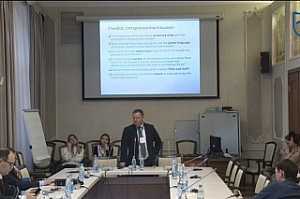Hein Roelfsema, Director of the Centre for Entrepreneurship of the Utrecht University School of Economics and a member of the Executive Board of the Institute of Economics and Management, spoke recently with students and teachers on the topic of entrepreneurial thinking in life and in the management of the university.
Dr. Roelfsema began with the fact that today the university needs to be an entrepreneurial institution to stay afloat. The world is changing, and the university must also change. It is important to change the internal culture. Today's path for universities is the path of entrepreneurial ecosystems, - he said. Among the key tasks of the transformation, he outlined the need to form interdisciplinary and interfaculty teams in order to “think more broadly”.
Despite the fact that someone is a specialist in biology, and someone else is good in chemistry or law, the task is to unite and study global social processes, and universities should aim at this path, - said Dr. Roelfsema. When there is a disjunction between the specialists in neighboring areas, nothing will work out quickly. It is necessary to create a favorable environment for collaboration between specialists in different disciplines.
According to Dr. Roelfsema, hubs can be such hotspots - various associations, discussion platforms, and joint projects. At the same time, it is also necessary to involve the stakeholders: business and external partners.
Dr. Roelfsema noted that the model of “a vinaigrette of faculties and problems”, when there are no strategically important directions, and there is an illusion that everything is important and so an equal quantity of resources is invested, is inefficient.
It is very difficult to manage a large structure, so everyone needs to work on one strategy. If you are trying to develop everything at once, this is not a strategy. What is more important, business, financing, or research? The moment of choosing priorities comes. Depending on the challenge that faces you, you need to develop units. If you have 50 faculties, it's difficult, and if 5 centers are working on several main tasks, it's much easier. We must not teach what needs to be learned, but how to learn new skills. It is important to be able to plug in and learn throughout life. This applies to both teachers and students.
Dr. Roelfsema also noted the importance of academic entrepreneurship and developing it in high school. In his opinion, it is necessary to focus on 5 factors: be proactive, ready to risk and compete, increase autonomy, and also respond quickly to market demands.
Teachers and guest partners came to the second seminar, “How to Become an Entrepreneur: World Outlook, Skills, and Secrets of Mastery”, even though it was announced as a student seminar. Not everyone was familiar with each other, but Dr. Roelfsema was able to unite participants so that all ten groups worked as well-coordinated business teams.
At the seminar, the groups felt themselves to be real competing organizations, accomplishing a practical task: to build the highest construction from 10 spaghetti pieces, sticky tape, and a toy balloon. Indeed, practical assignments have become the starting point for making general conclusions about how to start your own business, what skills are needed for this, how to interact with each other, and what strengths and weaknesses each has.
An entrepreneur is someone who looks around very closely around and can see the problems and weak points in the environment. And, seeing this, an entrepreneur can find an effective solution, - said Dr. Roelfsema.

